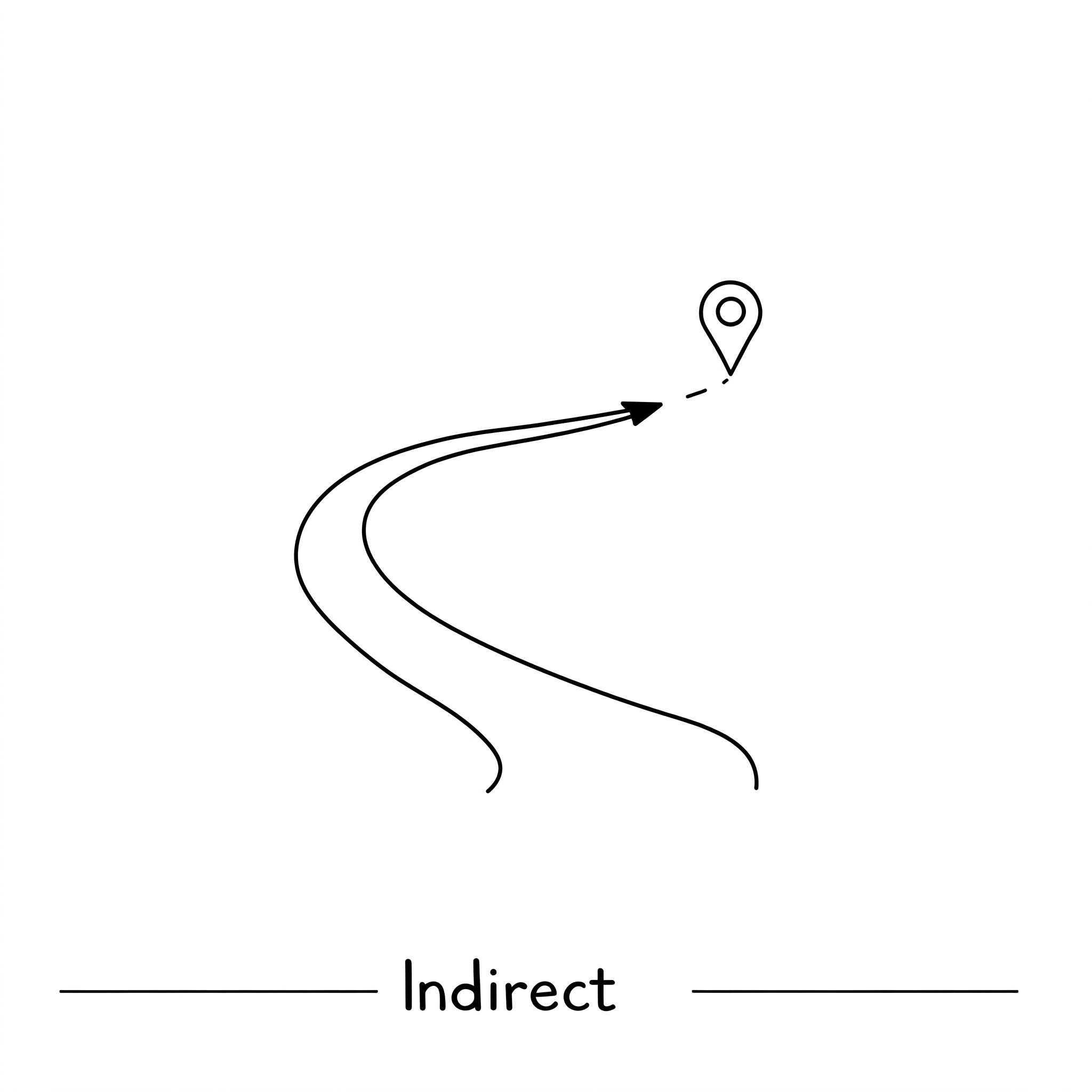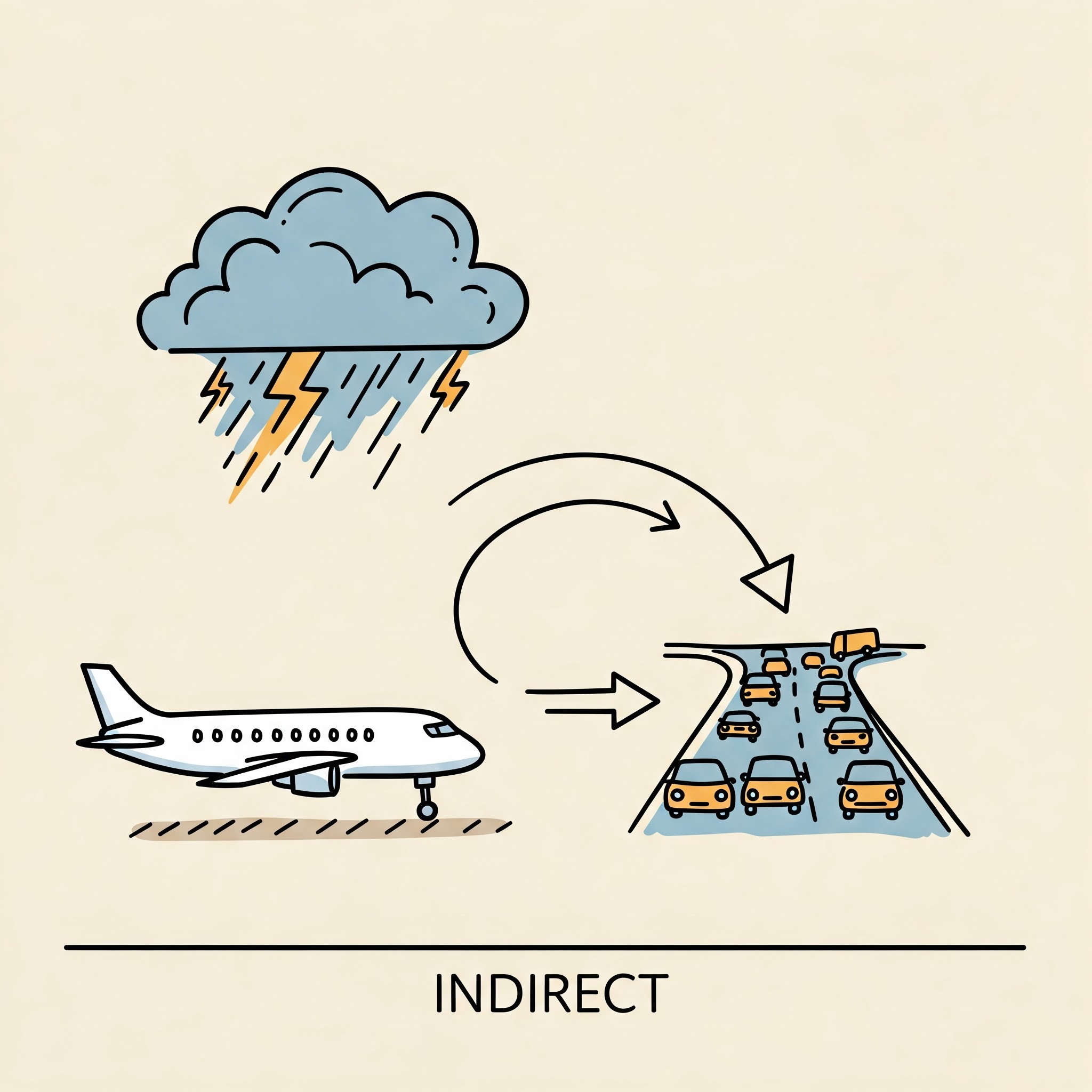Indirect
Definition
Indirect is an adjective that describes something not directly caused, aimed, or stated. It refers to actions, communication, or paths that are not straightforward or explicit.
Parts of Speech
- Adjective
Pronunciation
American English
- IPA Pronunciation: /ˌɪn.daɪˈrɛkt/ or /ˌɪn.dɪˈrɛkt/
- Respelling: in-dy-REKT or in-di-REKT
British English
- IPA Pronunciation: /ˌɪn.daɪˈrɛkt/ or /ˌɪn.dɪˈrɛkt/
- Respelling: in-dy-REKT or in-di-REKT
Etymology
The word "indirect" originates from the Late Latin "indirectus," meaning "not straight," derived from "in-" (not) and "directus" (straight). It was introduced into Middle English in the 15th century.
Derivatives
- Indirectly (adverb)
- Indirectness (noun)
- Indirective (adjective)
- Indirectnesses (plural noun)
- Indirective (adjective)
Synonyms
- Circuitous
- Oblique
- Roundabout
Antonyms
- Direct
- Straightforward
- Explicit
Usage
The term "indirect" is used to describe subtle actions, speech, or connections. For example, "The evidence was indirect but compelling," or "She made an indirect reference to her intentions."
Related Terms
- Oblique: Not explicit or straightforward.
- Implicit: Implied rather than expressly stated.
- Devious: Taking a longer or less straightforward route.
Detailed Definitions
Adjective
- Not directly caused or resulting from something: Describes effects or outcomes that are not straightforward.
- Example: "The storm had an indirect impact on travel delays."
- Not straightforward or explicit: Refers to communication or actions that are subtle or roundabout.
- Example: "He gave an indirect answer to the question."
- Taking a longer or less straightforward route: Describes paths or methods that deviate from the shortest course.
- Example: "They took an indirect route to avoid traffic."
indirect



🇨🇳 Mandarin Chinese
- 间接 (jiànjiē): indirect
- IPA: /tɕjɛn.tɕiɛ/
- Respelling: jyen-jyeh
- 迂回 (yūhuí): roundabout, circuitous
- IPA: /y.huɪ/
- Respelling: yuu-hway
🇮🇳 Hindi
- परोक्ष (paroksh): indirect
- IPA: /pəɾoːkʃ/
- Respelling: puh-rohk-sh
- अप्रत्यक्ष (apratyaksh): non-direct, implicit
- IPA: /əpɾətjəkʃ/
- Respelling: uh-pruh-tyuhk-sh
🇪🇸 Spanish
- Indirecto: indirect
- IPA: /indiˈrekto/
- Respelling: in-dee-rek-toh
- Oblicuo: oblique
- IPA: /o'βlikwo/
- Respelling: oh-blik-woh
🇫🇷 French
- Indirect: indirect
- IPA: /ɛ̃diʁɛkt/
- Respelling: an-dee-rekt
- Détourné: diverted, roundabout
- IPA: /detuʁne/
- Respelling: deh-turn-ay
🇦🇪 Modern Standard Arabic
- غير مباشر (ghayr mubashar): indirect
- IPA: /ɣajr mubaːʃar/
- Respelling: ghayr moo-bah-shar
- غير مستقيم (ghayr mustaqeem): not straight
- IPA: /ɣajr mus.ta.qiːm/
- Respelling: ghayr musta-keem
🇧🇩 Bengali
- পরোক্ষ (porokkh): indirect
- IPA: /pɔrokkho/
- Respelling: poh-rohk-kho
- অপ্রত্যক্ষ (aprotyakkho): unseen, invisible
- IPA: /apro̯tjakːho/
- Respelling: a-proh-tyahk-kho
🇷🇺 Russian
- Косвенный (kosvennyy): indirect
- IPA: /kɐsˈvʲenːɨj/
- Respelling: kos-ven-ny
- Непрямой (nepryamoy): non-direct, roundabout
- IPA: /nʲɪˈprʲaməj/
- Respelling: nee-pryah-moy
🇵🇹 Portuguese
- Indireto: indirect
- IPA: /ĩdiˈɾetu/
- Respelling: in-dee-reh-too
- Obliquo: oblique
- IPA: /o'bligu/
- Respelling: oh-blik-goo
🇮🇩 Indonesian
- Tidak langsung: indirect
- IPA: /ˈti.d̪ak ˈlaŋ.suŋ/
- Respelling: tee-dak lahng-soong
- Memutar: roundabout
- IPA: /məˈmʊ.t̪ar/
- Respelling: meh-moo-tahr
🇩🇪 German
- Indirekt: indirect
- IPA: /ˌɪndiˈʁɛkt/
- Respelling: in-dee-rekt
- Umlaufend: circulating, roundabout
- IPA: /ʊmˈlaʊ̯fənt/
- Respelling: oom-laow-fuhnt
🇯🇵 Japanese
- 間接的 (kansetsuteki): indirect
- IPA: /kanseʦɯ̥tekʲi/
- Respelling: kahn-set-su-teh-kee
- 回り道 (mawarimichi): detour, roundabout way
- IPA: /maɰaɾi̥mit͡ɕi/
- Respelling: mawah-ree-mee-chee
🇻🇳 Vietnamese
- Gián tiếp: indirect
- IPA: /ˈzaːn˧ˀ˥ tie̯p˧˧ˀ/
- Respelling: zahn teep
- Vòng vo: roundabout, circuitous
- IPA: /vɔ̄ˀŋ vɔ̄ˀŋ/
- Respelling: vohng vohng
🇰🇷 Korean
- 간접적인 (ganjeopjeogin): indirect
- IPA: /kan.dʑʌp.tɕʌ.ɡin/
- Respelling: gahn-jeop-cheo-gin
- 우회적인 (uhoejeogin): roundabout, detour
- IPA: /uhoe.tɕʌ.ɡin/
- Respelling: oo-hweh-jeo-gin
🇹🇷 Turkish
- Dolaylı: indirect
- IPA: /doˈɫajɫɯ/
- Respelling: doh-lai-lee
- Çevresel: circumferential, peripheral
- IPA: /tʃevreˈsel/
- Respelling: chev-re-sel
🇵🇰 Urdu
- غیر مستقیم (ghair mustaqeem): indirect
- IPA: /ɣɛːr mustəˈqiːm/
- Respelling: ghehr musta-keem
- غیر براہ راست (ghair brah raast): non-direct
- IPA: /ɣɛːr bɾɑːɦ rɑːst/
- Respelling: ghehr brah raast





